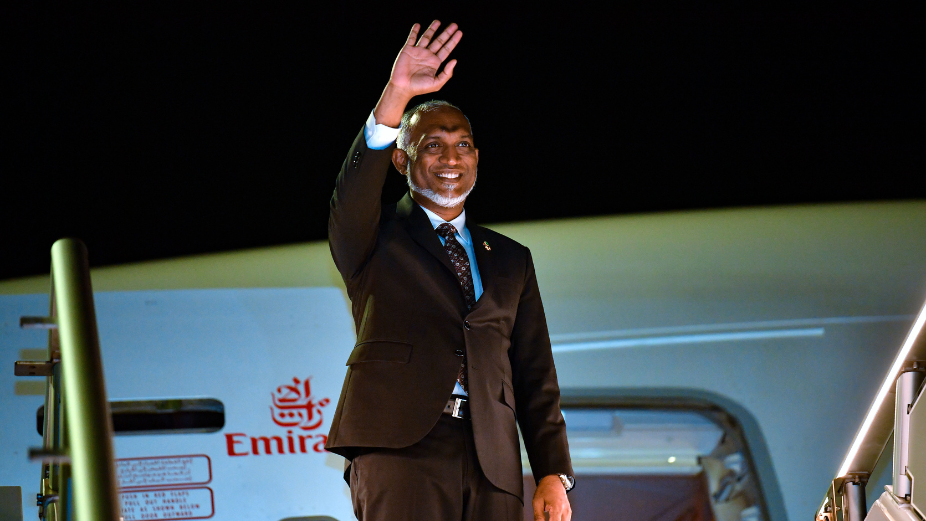
The geopolitical dynamics of South Asia are as multifaceted and delicate as the region’s rich cultural tapestry. In recent months, the Maldives has found itself at the centre of a diplomatic whirlwind, with the newly elected President, Dr Mohamed Muizzu, navigating the delicate balance between fostering relations with India and affirming the country’s sovereignty. Currently in India at the invitation of Prime Minister Narendra Modi, President Muizzu’s visit holds significant implications for the future of Maldives-India relations.
The Political Context
President Muizzu’s administration has been marked by a noticeable pivot from the pro-India stance of his predecessor. This shift was most evident during his election campaign and the events that led up to the election, which prominently featured the “India Out” slogan, advocating for the removal of Indian military personnel stationed in the Maldives. These troops were initially deployed to provide medical and humanitarian assistance, but their presence became a point of contention in Maldivian domestic politics.
Upon assuming office, President Muizzu’s initial foreign visits included Türkiye, the United Arab Emirates, and China, rather than India, a departure from tradition for Maldivian leaders. This move was perceived as a signal of his administration’s intention to recalibrate its foreign policy, potentially leaning more towards China, which has been increasing its influence in the region through its Belt and Road Initiative.
Diplomatic Tensions
The Maldives’ relationship with India has historically been robust, illustrated by India’s swift and substantial assistance during crises such as the 1988 coup attempt, the 2004 tsunami, and the 2014 Malé water crisis. However, the recent anti-India rhetoric and policy decisions, such as the cancellation of a hydrography agreement, have strained these ties. The situation was further exacerbated by derogatory comments made by Maldivian government officials with close ties to President Muizzu about Prime Minister Modi, leading to social media campaigns and calls for boycotts by Indian tourists.
The Visit: A Step Towards Reconciliation?
Against this backdrop, President Muizzu’s presence in India for Prime Minister Modi’s historical inauguration could be seen as a crucial step towards mending bilateral relations. The visit comes at a time when both nations recognize the importance of maintaining a stable relationship, given their strategic and economic interests.
President Muizzu expressed his anticipation of working closely with Prime Minister Modi to advance shared interests and promote regional stability. This diplomatic engagement is not just about optics; it signifies a potential recalibration of Maldives’ foreign policy, aiming to balance its relations with both India and China.
Economic Interdependence
The economic ties between the Maldives and India are significant, particularly in the tourism sector. India is one of the largest sources of tourists to the Maldives, contributing substantially to its economy, especially during the low season. The recent calls for boycotts by Indian tourists in response to political tensions highlight the economic ramifications of diplomatic relations. A prolonged downturn in tourist arrivals from India could impact the Maldivian economy, which is still recovering from the effects of the COVID-19 pandemic.
Moreover, India has been a crucial partner in infrastructure development in the Maldives, providing grants and credit facilities for various projects. The potential for increased Chinese investment through the Belt and Road Initiative introduces a competitive dynamic, with the Maldives needing to navigate these relationships carefully to maximize its benefits without compromising its sovereignty and bilateral relations.
Future Prospects
As President Muizzu engages in high-level diplomacy in India, the future of Maldives-India relations hangs in the balance. Will this visit mark the beginning of a thaw in bilateral relations, or will it merely serve as a diplomatic formality amidst more profound geopolitical shifts? The coming months will be critical in determining the trajectory of this relationship.
For the Maldives, the challenge lies in balancing its historical ties with India and the burgeoning opportunities presented by China. For India, maintaining its influence in the Indian Ocean region is paramount, especially in the face of increasing Chinese assertiveness. Both nations must navigate this complex landscape with diplomacy and strategic foresight.
President Muizzu’s visit to India is more than just a ceremonial engagement; it is a significant moment that could redefine the diplomatic contours of the Indian Ocean region. As the world watches, the outcomes of this visit will likely have far-reaching implications for regional stability and economic prosperity.












